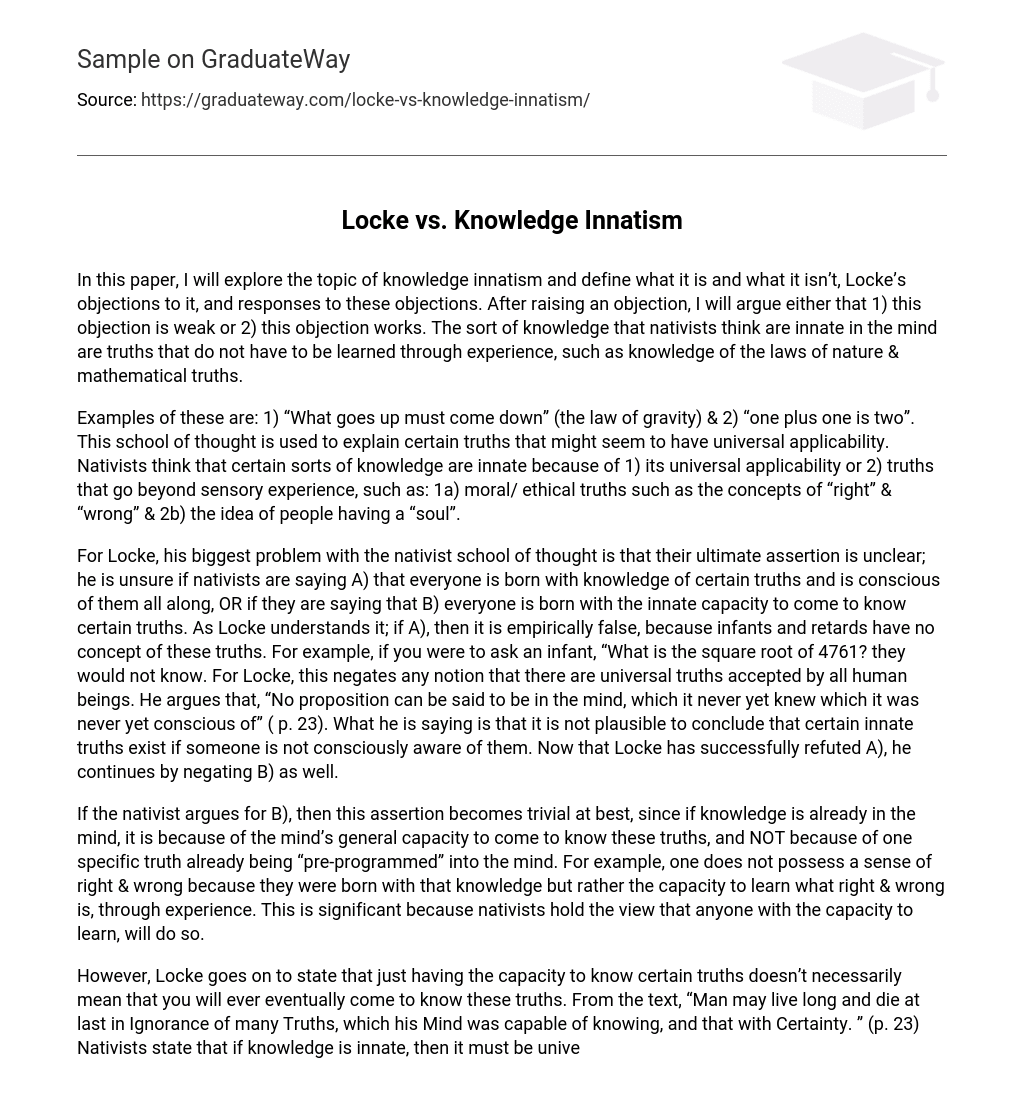The paper discusses knowledge innatism, its definition, implications, Locke’s criticism of it, and the different responses to these criticisms. The objections against innatism will be examined and arguments will be presented either supporting their weaknesses or acknowledging their validity. Nativists argue that certain knowledge exists inherently in the mind, regardless of experience. This includes comprehension of natural laws and mathematical truths.
Examples of these include the law of gravity (“What goes up must come down”) and the equation “one plus one is two”. This school of thought is utilized to justify certain truths that might appear to have universal applicability. Nativists believe that certain types of knowledge are inherent due to their universal applicability or truths that surpass sensory experience, such as moral/ethical truths like “right” and “wrong” and the concept of a “soul”.
Locke criticizes the nativist school of thought for their unclear assertion. He questions whether nativists believe A) that all individuals are born with knowledge of certain truths and are immediately conscious of them, or if they believe B) that everyone is born with the innate capacity to learn these truths. According to Locke, if A) is true, then it is empirically false, as infants and individuals with intellectual disabilities lack awareness of these truths. Locke uses the example of asking an infant about the square root of 4761 to illustrate this point. He argues that this refutes the existence of universal truths accepted by all humans, stating that a proposition cannot be considered in the mind if one is not consciously aware of it. Having refuted A), Locke goes on to discredit B) as well.
The nativist supports position B), which asserts that knowledge is already present in the mind as a result of its ability to acquire truths, rather than a specific truth being pre-programmed. For example, individuals are not inherently equipped with a sense of right and wrong; instead, they possess the potential to learn what is right and wrong through their experiences. Nativists hold the belief that anyone who has the capacity to learn will inevitably do so.
Locke argues that simply having the ability to comprehend certain truths does not guarantee that one will actually come to know these truths. In his words, “Man may live long and die at last in Ignorance of many Truths, which his Mind was capable of knowing, and that with Certainty.” Nativists claim that if knowledge is inherent, then it must be universally applicable. Certain truths, such as mathematical principles, are indeed universal. Moreover, the potential for all individuals to grasp these truths is also universal.
According to Locke, concepts can be differentiated and are distinct. He contends that universal knowledge is not innate, implying that the fact of something being universally true, like “1+1 = 2”, does not mean it is inherently comprehended by everyone. Infants and those with intellectual disabilities lack the capacity to understand this truth. Thus, Locke refutes the existence of universal innate knowledge. Nevertheless, proponents of innatism may counter that knowledge exists within the mind but requires realization.
Although there is a common belief that ideas or propositions exist in the mind before awareness, it is actually through the mind’s acquisition of knowledge that these ideas are present. The existence of unknown and incomprehensible truths does not diminish their presence during an individual’s lifetime.
Despite knowledge being universal, it is not naturally inherent. The mind can acquire knowledge through sensory experiences, according to John Locke, an empiricist who asserts that certain truths can only be known through the senses. By interacting with the world, we gain understanding of nature, our environment, and ourselves. I agree with Locke’s viewpoint as my knowledge comes from a range of experiences, although I may not have encountered enough to fully understand everything.
I am able to comprehend ideas that are intangible, like the notion of a human “soul”. Although I have never visually encountered a “soul”, I am capable of explaining its meaning confidently since I have gained knowledge about it through texts, conversations, and my own logical thinking based on widely accepted definitions. Nevertheless, I find difficulty when considering examples like infants or individuals with mental disabilities.
A precocious child may acquire mathematical knowledge before developing the ability to communicate verbally. One can envision a child engaging in play with pennies and comprehending how to count, add, and subtract them. The mentally handicapped individual serves as a slightly less convincing illustration. They may possess an understanding of morality, but their inability to speak stems from insufficient motor coordination and communication skills. Advocates of innate knowledge assert that knowledge is both innate and universally present.
Although there are certain universal truths, such as the universality of math, not all individuals may be consciously aware of them. An example is the concept that “one plus one equals two,” which holds true universally regardless of individual awareness. However, understanding or expressing this truth may not be innate for everyone, as infants or those with mental retardation may lack this ability. Nevertheless, a person’s capacity to acquire knowledge can be considered innate. Yet, possessing this potential does not ensure complete knowledge.
Even if someone spends their whole life in isolation or as a recluse, they still acknowledge that certain truths exist. Not experiencing or understanding universal truths doesn’t make them nonexistent. However, every individual has the ability to gain knowledge about different aspects of human existence.





